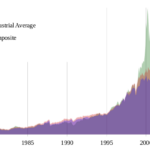The impact of high interest rates on the broader economy
- Rising mortgage rates may impact credit card bills, auto loans, and medical debt
- Businesses reliant on cheap capital may face financial difficulties
- Home sales are already at record lows due to homeowners retaining low fixed mortgage rates
- Transition from 6% to 8% mortgage rates won’t have a significant impact on buyer budgets
- Potential increase in distressed sales and slight decline in home prices
- Cash buyers make up a third of all buyers in the housing market
- If the economy contracts, the Federal Reserve may lower interest rates, making homebuying more affordable
- Housing demand could grow even if the broader economy falters
- The housing market may remain frozen until late 2024, coinciding with an economic slowdown
- If the economy breaks, the housing market could be the sector that bucks the downturn
The U.S. economy has shown resilience despite rising mortgage rates, but the impact on the broader economy may change in the coming months. Elevated interest rates will affect consumers’ credit card bills, auto loans, and medical debt, while businesses relying on cheap capital may face financial difficulties. However, the housing market is unlikely to be the catalyst for a catastrophic economic break, as home sales are already at record lows due to homeowners retaining low fixed mortgage rates. The transition from 6% to 8% mortgage rates won’t have a significant impact on buyer budgets. There may be a slight increase in distressed sales and a marginal decline in home prices, but cash buyers, who make up a third of all buyers, are eager for discounted properties. If the economy contracts, the Federal Reserve may lower interest rates, making homebuying more affordable. Housing demand could grow even if the broader economy falters. The housing market may remain frozen until late 2024, coinciding with an economic slowdown. However, if the economy breaks, the housing market could be the sector that bucks the downturn.
Factuality Level: 7
Factuality Justification: The article provides analysis and predictions about the potential impact of rising mortgage rates on the housing market and the broader economy. The authors provide their perspective and opinions based on their expertise in economics and housing research. While the article does not contain misleading information or sensationalism, it does include some speculative statements and predictions that may not be universally accepted as factual. Overall, the article presents a balanced analysis but with a certain level of uncertainty in its predictions.
Noise Level: 7
Noise Justification: The article provides some analysis of the potential impact of rising mortgage rates on the housing sector and the broader economy. However, it lacks evidence, data, or examples to support its claims. It also does not provide actionable insights or solutions for readers. Additionally, the article contains irrelevant information about the authors and a request for feedback on text-to-speech technology, which adds to the noise level.
Financial Relevance: Yes
Financial Markets Impacted: The article mentions the potential risks to banks heavily invested in the debt of businesses that may face insolvencies due to elevated interest rates.
Presence Of Extreme Event: No
Nature Of Extreme Event: No
Impact Rating Of The Extreme Event: No
Rating Justification: The article discusses the potential impact of rising interest rates on the economy and the housing market, highlighting the risks to businesses and banks. However, it does not mention any extreme events or provide an impact rating.
Public Companies: Redfin (N/A)
Private Companies: JPMorgan Chase,Amazon,Boston Fed
Key People: Chen Zhao (Economics Team Leader at Redfin), Daryl Fairweather (Chief Economist of Redfin)
 www.marketwatch.com
www.marketwatch.com 





